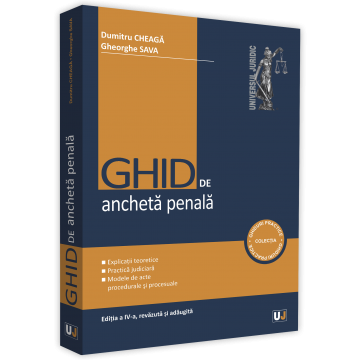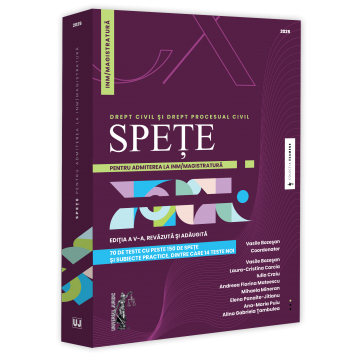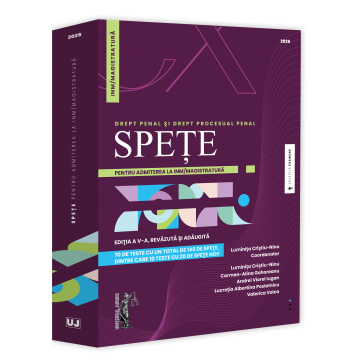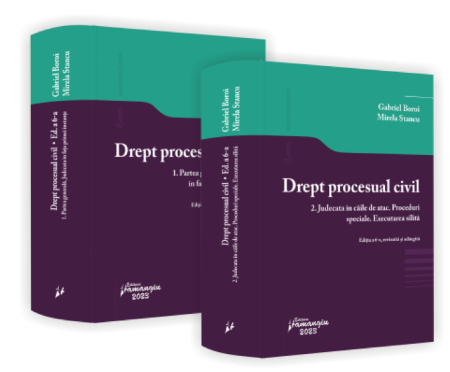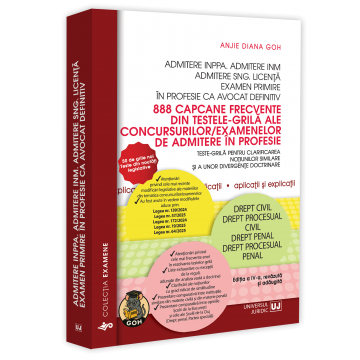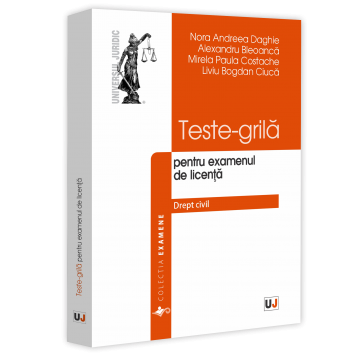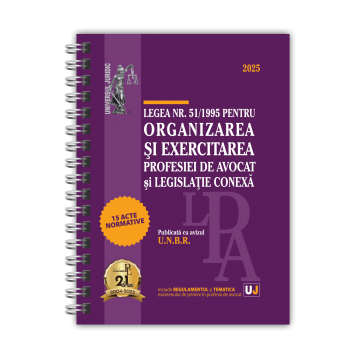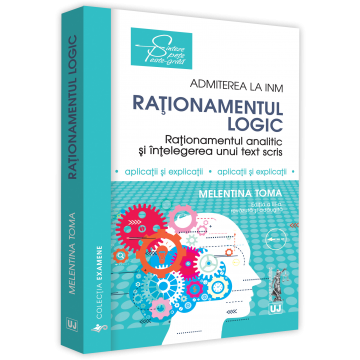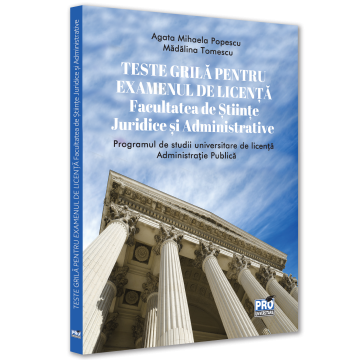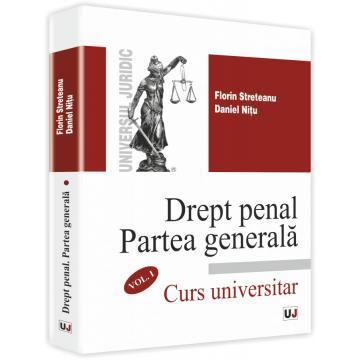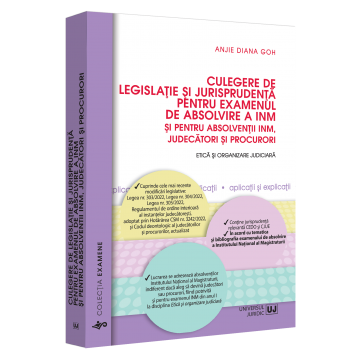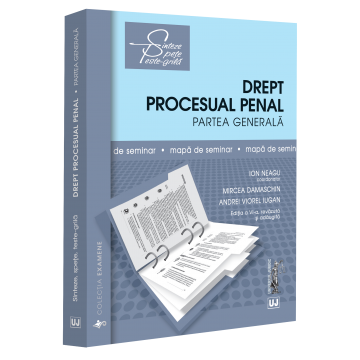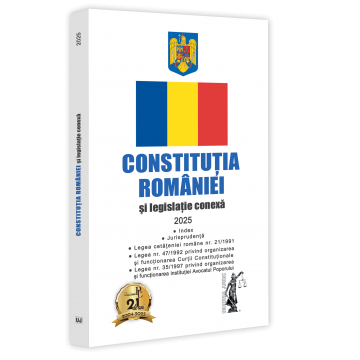Manuscript proposals: [email protected] / 0745 204 115 //// Tracking orders Individuals / Sales: 0745 200 357 / Orders Legal entities: 0721 722 783
Publisher: Universul Juridic
Author: Alexandru Ticlea
Pages: 406
Publisher year: 2020
ISBN: 978-606-39-0597-1
Product Code:
9786063905971
Do you need help?
0745 200 357
- Description
- Download (1)
- Authors
- Content
- More details
- Reviews (0)
The present paper has, therefore, as object of study and research an important, indispensable element of the legal labor / service relations: the working time and the rest time.
The mentioned ratios are inconceivable apart from the two time components. Any subordinate work cannot be performed continuously, without breaks, rests and other free time. It would be impossible.
At the same time, without a work schedule there can be no employment relationship, regardless of its nature.
To protect the health and safety of employees, working time must be limited. Therefore, our legislator, like the international and European one, establishes a normal duration of working time (8 hours a day and 40 hours a week). Only exceptionally, the duration of 40 hours can be exceeded, at 48 hours per week.
But additional work is possible only under certain conditions and with restrictions, and as a rule, with the consent of employees.
For the same reasons of their personal protection, the 8-hour daily program must be divided into a lunch break, and Saturdays, Sundays and public holidays are days off.
In order to respond to the employers' interest, specific aspects encountered in their practice regarding the unequal distribution of working time, individualized programs, reduced working time, evidence of hours worked, including overtime, etc. were presented and explained. At the same time, I answered questions or problems raised or raised during various meetings with representatives of employers and other specialists during conferences or courses, etc. organized by the National Union of Experts in Labor Legislation, by the Romanian Journal of Labor Law, by the Ecological University of Bucharest and other entities.
The second part of the paper is devoted to rest time.
We took care of highlighting and presenting the relevant regulations and we took into account, treating them separately: breaks, rests, public holidays, rest leave and other holidays, including leave for temporary incapacity for work, maternity, maternal risk, accommodation risk, etc.
Regarding the weekly rest, I explained, in the interest of those interested, under what conditions work can be performed on Saturdays and Sundays, which is the amount of the increase, if working 6 days a week or more up to the legal maximum of 14 days.
Regarding the rest leave, we took into account the obligations of the employers related to the collective and individual scheduling, its performance, the amount and payment of the indemnity, the recall from the leave. We also specified, for example, that periods of temporary incapacity for work or maternity leave are assimilated to work performed.
As a result, these periods will be taken into account when granting the leave in question. However, the leave for raising the child aged 2, respectively 3 years will not be taken into account.
Although it is not simply a time of rest, we also dealt with other holidays, for example those for paid or unpaid training, for solving personal situations, those due to distinct categories of staff (teachers, civil servants with special status, magistrates, etc.), temporary incapacity for work, etc.
The last part of the work (III) is intended for the particularities regarding the working and rest time of some categories of personnel (drivers, civil aeronautical personnel, mobile workers who provide interoperability services in the railway sector, professional maternity assistants).
Knowing the importance of the jurisprudence in the application of the legislation to concrete cases, we selected over 70 court decisions on the issue of the analyzed topic, which we attached to the corresponding chapters of our paper.
We believe that in this way we respond to the interest of practitioners - legal advisers, lawyers, magistrates, human resources specialists, managers - but also to those concerned with the study of legal norms, doctrine and jurisprudence in the field - students, masters, doctoral students, legal theorists, etc.
At the same time, we respond to the practical and theoretical needs of those interested in the issue of the topic that forms the object of this paper.
Structured in three parts which, in turn, are divided into targeted chapters, this volume is a detailed debate of working time and rest time. The first part is dedicated to working time, the second has as its theme rest time, and the third part addresses the particularities of working time and rest of certain categories of staff with a special status, such as drivers, aeronautical staff or the one in education. Presenting these topics in detail, the paper supports legal advisers, lawyers, magistrates, human resources specialists, managers, but also those concerned about the environment. prudence in the matter, providing all the information needed for the application of the laws in force or for the accomplishment of some specialized works.
Product compliance information
The mentioned ratios are inconceivable apart from the two time components. Any subordinate work cannot be performed continuously, without breaks, rests and other free time. It would be impossible.
At the same time, without a work schedule there can be no employment relationship, regardless of its nature.
To protect the health and safety of employees, working time must be limited. Therefore, our legislator, like the international and European one, establishes a normal duration of working time (8 hours a day and 40 hours a week). Only exceptionally, the duration of 40 hours can be exceeded, at 48 hours per week.
But additional work is possible only under certain conditions and with restrictions, and as a rule, with the consent of employees.
For the same reasons of their personal protection, the 8-hour daily program must be divided into a lunch break, and Saturdays, Sundays and public holidays are days off.
In order to respond to the employers' interest, specific aspects encountered in their practice regarding the unequal distribution of working time, individualized programs, reduced working time, evidence of hours worked, including overtime, etc. were presented and explained. At the same time, I answered questions or problems raised or raised during various meetings with representatives of employers and other specialists during conferences or courses, etc. organized by the National Union of Experts in Labor Legislation, by the Romanian Journal of Labor Law, by the Ecological University of Bucharest and other entities.
The second part of the paper is devoted to rest time.
We took care of highlighting and presenting the relevant regulations and we took into account, treating them separately: breaks, rests, public holidays, rest leave and other holidays, including leave for temporary incapacity for work, maternity, maternal risk, accommodation risk, etc.
Regarding the weekly rest, I explained, in the interest of those interested, under what conditions work can be performed on Saturdays and Sundays, which is the amount of the increase, if working 6 days a week or more up to the legal maximum of 14 days.
Regarding the rest leave, we took into account the obligations of the employers related to the collective and individual scheduling, its performance, the amount and payment of the indemnity, the recall from the leave. We also specified, for example, that periods of temporary incapacity for work or maternity leave are assimilated to work performed.
As a result, these periods will be taken into account when granting the leave in question. However, the leave for raising the child aged 2, respectively 3 years will not be taken into account.
Although it is not simply a time of rest, we also dealt with other holidays, for example those for paid or unpaid training, for solving personal situations, those due to distinct categories of staff (teachers, civil servants with special status, magistrates, etc.), temporary incapacity for work, etc.
The last part of the work (III) is intended for the particularities regarding the working and rest time of some categories of personnel (drivers, civil aeronautical personnel, mobile workers who provide interoperability services in the railway sector, professional maternity assistants).
Knowing the importance of the jurisprudence in the application of the legislation to concrete cases, we selected over 70 court decisions on the issue of the analyzed topic, which we attached to the corresponding chapters of our paper.
We believe that in this way we respond to the interest of practitioners - legal advisers, lawyers, magistrates, human resources specialists, managers - but also to those concerned with the study of legal norms, doctrine and jurisprudence in the field - students, masters, doctoral students, legal theorists, etc.
At the same time, we respond to the practical and theoretical needs of those interested in the issue of the topic that forms the object of this paper.
Structured in three parts which, in turn, are divided into targeted chapters, this volume is a detailed debate of working time and rest time. The first part is dedicated to working time, the second has as its theme rest time, and the third part addresses the particularities of working time and rest of certain categories of staff with a special status, such as drivers, aeronautical staff or the one in education. Presenting these topics in detail, the paper supports legal advisers, lawyers, magistrates, human resources specialists, managers, but also those concerned about the environment. prudence in the matter, providing all the information needed for the application of the laws in force or for the accomplishment of some specialized works.
-
Treaty on working time and rest time. Legislation. Doctrine. Jurisprudence - Alexandru Ticlea
Download
Alexandru Ticlea
Studies:
Bachelor of Laws (University of Bucharest, Faculty of Law: 1973-1977 - Department of Economic and Administrative Law; 1978-1982 - Department of Law); doctor of law (1989); has competences in Labor Law, Social Security Law, Civil Law, Commercial Law, Rhetoric.
Activities:
He is Vice President - Ecological University of Bucharest; Rector, PhD professor - Ecological University of Bucharest (2008-2016); lawyer - Bucharest Bar; president - Romanian Labor Law Association; founding director - Romanian Journal of Labor Law; associate member - Romanian Academy of Scientists; honorary president - Union of Experts in Labor Legislation; arbitrator - Arbitration Tribunal in Transports; corresponding member - Academy of Legal Sciences.
Doctor honoris causa:
- since December 2013 at the State University of Chisinau, Republic of Moldova;
- since May 2015 at the University of Wallachia in Targoviste;
- since September 2015 at Vasile Goldis University of Arad.
Publications:
- Published: 103 treatises, courses, monographs; 194 articles, studies, notes; 7 papers published abroad.
- Participated in numerous conferences, seminars, scientific symposia.
- He is a member of the scientific research committee on projects funded by the European Commission ("The right to strike in Europe", "Trade Union representation in the European Union member countries").
- Award-winning works: by the Union of Romanian Lawyers (Rhetoric, 2008, “Ioan Gruia” Award; Public Labor Law, 2011, Special Prize; Labor Law Treaty, 8th Edition, 2014, Honorary Diploma); of the Roman Academy
Studies:
Bachelor of Laws (University of Bucharest, Faculty of Law: 1973-1977 - Department of Economic and Administrative Law; 1978-1982 - Department of Law); doctor of law (1989); has competences in Labor Law, Social Security Law, Civil Law, Commercial Law, Rhetoric.
Activities:
He is Vice President - Ecological University of Bucharest; Rector, PhD professor - Ecological University of Bucharest (2008-2016); lawyer - Bucharest Bar; president - Romanian Labor Law Association; founding director - Romanian Journal of Labor Law; associate member - Romanian Academy of Scientists; honorary president - Union of Experts in Labor Legislation; arbitrator - Arbitration Tribunal in Transports; corresponding member - Academy of Legal Sciences.
Doctor honoris causa:
- since December 2013 at the State University of Chisinau, Republic of Moldova;
- since May 2015 at the University of Wallachia in Targoviste;
- since September 2015 at Vasile Goldis University of Arad.
Publications:
- Published: 103 treatises, courses, monographs; 194 articles, studies, notes; 7 papers published abroad.
- Participated in numerous conferences, seminars, scientific symposia.
- He is a member of the scientific research committee on projects funded by the European Commission ("The right to strike in Europe", "Trade Union representation in the European Union member countries").
- Award-winning works: by the Union of Romanian Lawyers (Rhetoric, 2008, “Ioan Gruia” Award; Public Labor Law, 2011, Special Prize; Labor Law Treaty, 8th Edition, 2014, Honorary Diploma); of the Roman Academy
content
ARGUMENT / 5
PART I. WORKING TIME / 7
CHAPTER I
GENERAL CONSIDERATIONS REGARDING WORKING TIME / 9
Notion. Content / 9
Defining working time in special legal norms / 11
Definitions of working time in the norms of the European Union / 14
Clarifications by the Court of Justice of the European Union on the notion of "working time" / 15
The importance of working time / 17
Classification of working time / 18
CHAPTER II
NORMAL DURATION OF WORKING TIME / 19
International regulation / 19
Constitutional regulation / 20
Regulation of the Labor Code / 20
General rules / 20
Uniform distribution of working time / 21
Unequal distribution of working time / 22
Individualized work programs / 22
Shift work / 23
Continuous work / 24
Work in turn / 25
Night work / 25
Evidence of working hours / 26
Judicial practice / 27
Working time and time available to the employer. Reporting on European case law / 27
Commercial representative. Travel time to customers. Its nature / 40
Captain of a ship. Work time. Specific / 45
Working time spent by employees during the incarceration organized by the employer / 47
Work in shifts. Increase for insulation conditions. Granting conditions / 53
Work in turn. Registered staff at the employer's disposal. Increased legality / 55
Security and guard personnel. Work in turn. Work on Saturday and Sunday. Increase for overtime and night work / 56
Night work. Rights / 59
Forester. Permanent supervision. Work time. Jurisprudence of the European Court / 61
Special regulations / 63
CHAPTER III
REDUCED WORKING TIME / 65
Situations / 65
Working time of young people up to 18 years / 65
International regulation / 65
European regulation / 65
National regulation / 66
Working time of employees working in special and special conditions / 68
Working time for pregnant and breastfeeding employees / 71
Work in periods of extreme temperatures / 72
Working time of medical staff in public health units / 74
Working time of employees who have suffered work accidents or occupational diseases / 75
Working time for home care for the elderly / 75
Part - time work / 76
International regulation / 76
European regulation / 77
Individual part - time employment contract / 78
Judicial practice / 84
Work time. Return from partial program to normal program by unilateral measure of the employer. Illegality / 84
Judicial practice regarding the amount of the indemnity for the scientific title of doctor in the case of part-time employees / 86
Speta I / 86
Case II / 88
Comments / 91
CHAPTER IV
ADDITIONAL WORK / 93
International regulation / 93
European regulation / 93
From the jurisprudence of the European Court of Justice regarding the observance of the maximum weekly working time / 95
Solutions of the European Court of Justice on working time records / 101
Obligation of employers to set up a system to measure the length of working time / 101
Monitoring the hours at which each worker starts and ends the working day, as well as the corresponding interruptions and breaks / 106
Additional work in national law / 107
Regulation of the Labor Code / 107
Regulation of additional work by other normative acts / 110
Employee agreement - condition for performing additional work / 111
Compensation for overtime / 112
Contraventional sanction for violating the legal provisions regarding additional work / 114
Judicial practice / 114
Additional work. Conditions. Preeminence of contractual clauses / 114
Additional work. Conditions / 122
Additional work. Regulation. Preeminence of contractual clauses. Lack of employer request. Periods in delegation / 125
Additional work. Delivery conditions. Weekly rest / 133
Additional work. Conditions. Courier / 135
Employer request for overtime / 138
Additional work. Employer records. Legality of the increase payment / 139
Highlighting overtime / 140
Obligation of the employer to grant days off and, as the case may be, to pay them / 140
Overtime. Their payment. Conditions. Incidence of consignments / 141
Overtime. Compensation and payment / 143
Working overtime. Proof of these. Obligation to pay / 145
Additional work. The burden of proof. Presumption of the court / 147
Increase for additional work and for public holidays. Cumul / 148
Public servant. Overtime. Significance of travel time at work points / 150
Politicians. Additional work. Compensation with free time, obligation of the unit / 152
Politicians. Normal working time. Weekly rest. Appropriate free time. Additional work. Salary increase. Invoking dispof the Labor Code. History of regulation / 156
Politicians. Work on weekly rest days. The succession of regulations. Preeminence of free time compensation / 172
Military. Overtime. Spor. Applicable rules / 183
Military. Work performed on Saturday and Sunday. Applicable law / 186
PART II. REST TIME / 187
CHAPTER V
GENERAL CONSIDERATIONS REGARDING TIME OF REST / 189
The notion of rest time / 189
International regulation / 189
European regulations / 190
National regulation / 190
Other forms of rest time / 191
CHAPTER VI
BREAKS, RESTS AND LEGAL HOLIDAYS / 192
Terminology / 192
Lunch break / 192
Breastfeeding breaks / 194
Daily rest / 195
Weekly rest / 195
Compensation and bonuses for staff paid from public funds / 199
Legal holidays / 199
Enumeration / 199
Free days granted by the Government / 200
January 1 and 2/201
Day of the Union of the Romanian Principalities - January 24/201
Good Friday, the last day of Friday before Easter / 202
First and second day of Easter / 202
May 1 - International Labor Day / 203
June 1 - Children's Day / 203
Pentecost / 204
Assumption of the Blessed Virgin Mary / 204
Saint Andrew / 204
December 1/205
The first and second day of Christmas / 205
Religious holidays in the case of persons belonging to other religious cults than Christians / 206
Obligation to grant days off / 206
Exceptions from the application of art. 139 para. (1) C. mun / 207
Compensations and bonuses / 208
Judicial practice / 208
Lunch break. The need to schedule it / 208
Weekly rest. Conditions for granting the increase / 210
Weekly rest. Compensation. Spor. Applicable collective labor agreement / 212
Work during the weekly rest. Compensation. Conditions for granting the increase / 214
Work on weekly rest days and public holidays. Spor. Applicable provisions / 217
Increase for additional work and for work performed on weekly rest days or on public holidays / 218
Increase for additional work and rest for the week or on public holidays. Possibility of cumulation / 221
Work performed on weekly rest days. The amount of the increase / 223
CHAPTER VII
REST LEAVE / 225
Introductory notions / 225
International regulation / 225
European regulation / 226
Interpretations and clarifications of the Court of Justice of the European Union regarding the regulation of rest leave / 226
Regulation of rest leave in the Labor Code / 233
Preliminaries / 233
Duration of (main) rest leave / 234
Additional rest leave / 234
Conditions for acquiring and exercising the right to rest leave / 235
Scheduling of rest leave / 237
Holiday allowance / 239
Taking leave / 243
Interruption of rest leave / 244
Cash compensation for rest leave / 247
Legal ways to defend the right to rest leave / 248
Judicial practice / 249
The right to rest leave pro rata temporis. Obligations of the employer / 249
Vacation. Programming. The use of the right. Holiday allowance / 251
Vacation. Programming. Made in nature. Rejection of the employee 's request / 254
Application for two days off. Disapproval. Consequences / 255
Vacation. Made in nature. The right to compensation. Prescription / 256
Rest leave not taken. Unsolicited. Consequences / 256
Vacation. Failure to grant it. The right to compensation in money / 257
The duration of the leave is proportional to the actual time worked. The amount of compensation / 258
Holiday allowance. Equivalent overtime. Invocation of Regulation (EC) no. 883/2004 / 259
Holiday allowance. Calculation method. Permanent bonuses. Invocation of European jurisprudence / 260
Compensation in cash for the unpaid rest leave. Irrelevance of lack of funds / 262
Vacation. Cash compensation / 263
Rest leave not taken. Cash compensation / 264
Rest leave not taken. Its payment / 266
Rest leave not taken. Granting it in a period of 18 months / 266
Mandate contract. Work time. Vacation. Applicable provisions / 267
Regulation of the rest leave of the teaching staff / 268
Duration of the rest leave / 268
Scheduling and performing rest leave / 269
Holiday allowance / 269
Interruption of rest leave / 269
Judicial practice / 270
Teaching staff paid by the hour. The right to rest leave / 270
Rest leave not taken. Teacher. Cash compensation. Conditions / 271
Rest leave not taken. Detachment of the employee. Maternity leave. Granting / 273
Regulation of rest leave according to H.G. no. 250/1992 regarding the rest leave and other leave of the employees from the public administration, from the autonomous utilities with special specificity and ofbudgetary units / 275
Duration of rest leave (principal) / 275
Additional rest leave / 276
Scheduling of rest leave / 277
Taking a vacation / 277
Holiday allowance / 278
Judicial practice / 278
Additional rest leave. Applicable regulations. Establishment of duration / 278
Rest leave not taken. Cash compensation. Consequences of secondment / 280
Regulation of rest leave according to Government Decision no. 442/1992 regarding the rest leave of officers, military foremen and non-commissioned officers in activity in the armed forces / 281
Duration of rest leave (principal) / 281
Additional leave / 281
Judicial practice / 282
Vacation. Military. Applicable law. Periods of temporary incapacity for work and maternity leave.
Jurisprudence of the Court of Justice of the European Union / 282
Military. Increase for working conditions. Holiday allowance / 284
Regulation of rest leave according to Government Decision no. 1578/2002 on the conditions under which the police officer is entitled to rest leave, paid study leave and leave, unpaid leave, rest tickets, treatment and recovery / 285
Duration of rest leave (principal) / 285
Additional rest leave / 286
Scheduling, rescheduling and postponement of holidays / 286
Taking a vacation / 287
Interruption of rest leave / 287
Restitution of the holiday allowance / 288
Judicial practice / 288
Border guards. Vacation. Applicable provisions. Parental leave / 288
Prison cops. Outstanding salary rights representing rest leave. Retirement / 289
Civil servants from the penitentiary administration system. The amount of the holiday allowance. Increases. Applicable rules / 290
Civil servant with special status. Holiday allowance. Recalculation. Permanent additions and bonuses / 292
Rest leave of judges and prosecutors / 295
Regulation / 295
Duration of leave / 295
Scheduling of holidays / 295
Taking leave / 296
Holiday allowance and premium / 296
Judicial practice / 298
Magistrate. Cash compensation for rest leave. Conditions. Applicable provisions / 298
Rest leave for specialized auxiliary staff and related staff of courts and prosecutor's offices attached to them / 299
Regulation / 299
Duration of leave / 300
Scheduling holidays / 300
Taking leave / 300
Holiday allowance / 301
Compensation in cash for the unpaid rest leave / 301
Judicial practice / 302
Probation services staff. The right to rest leave. The need for request. Applicable law / 302
CHAPTER VIII
OTHER HOLIDAYS AND DAYS / 304
The notion of other holidays / 304
Leave for professional training provided by the Labor Code / 304
Preliminaries / 304
Unpaid leave / 305
Paid leave / 306
Unpaid leave for personal situations / 306
Days off according to collective labor agreements / 307
Other holidays of the employees from the public administration, from the specific autonomous utilities and from the budgetary units / 307
Regulation / 307
Paid leave for special family events / 307
Unpaid leave / 308
Other holidays and days off provided for pre - university education / 308
Regulation / 308
Paid leave for doctorate or work in the interest of education / 309
Paid days off / 309
Unpaid leave / 310
Additional paternity leave / 310
Other holidays benefited by the teaching staff from higher education / 311
Regulation / 311
Paid leave / 311
Unpaid leave / 311
Other leave and leave provided in the case of police officers / 311
Regulation / 311
Study leave / 311
Paid consignments / 312
Unpaid leave / 312
Other leave and leave in the case of penitentiary police / 313
Judicial practice / 313
Policeman. Work program. Vacation. Unpaid leave. Medical treatment / 313
Policeman. The right to paid consent. National and European provisions / 315
Other leave provided for in the case of military personnel / 316
Other holidays and days off provided for judges and prosecutors / 317
The legal source / 317
Vocational training leave / 317
Unpaid leave / 318
Medical leave / 318
Holidays for special family events / 319
Other holidays and days off provided for the specialized auxiliary staff and the related staff of the courts and the prosecutor's offices attached to them / 319
Regulation / 319
Vocational training leave / 319
Paid days off / 320
Unpaid leave / 320
Leave for temporary incapacity for work / 320
Maternity leave / 322
Material risk leave / 324
Paternity leave / 324
Accommodation leave / 325
Growth leavethe child / 325
Sick childcare leave / 327
Other specific days off / 329
Situations / 329
Free day for child health care / 329
Blood Donor Free Day / 330
Judicial practice / 330
Sick leave. Compensation for temporary incapacity for work. Granting conditions / 330
Leave for raising a child up to 2 years old. Holiday allowance. Collective labor contract / 331
Local policeman. Sick leave. Food standard / 333
Policeman. Applicable regulations. The situation of parental leave / 334
Policeman. Parental leave. Suspension of service report / 335
PART III. PARTICULARITIES REGARDING THE WORKING AND REST TIME OF SOME CATEGORIES OF STAFF / 339
CHAPTER IX
DRIVING PERIODS, BREAKS AND REST PERIODS OF DRIVERS / 341
Regulation / 341
The meaning of the terms and expressions according to the Government Decision no. 38/2008 / 341
Organization of working time / 343
Obligations of employers and self - employed workers / 344
The contraventions provided by H.G. no. 38/2008 / 344
Contraventions and sanctions provided by O.G. no. 37/2007 / 345
CHAPTER X
STAFF WORK AND REST TIME
CIVIL AERONAUTICS / 350
Staff categories / 350
Definitions / 350
Limits of service period for flight / 352
Cumulative limits on the flight duty period and duty period / 354
Rest time / 354
Extended flight duty period / 355
Judicial practice / 356
Air navigation personnel. Work performed on public holidays and weekly rest days. Spor / 356
Traffic controllers. Increase for difficult and dangerous conditions, as well as for work performed on Saturday and Sunday / 361
CHAPTER XI
PARTICULARITIES OF WORKING TIME AND REST IN THE CASE OF MOBILE WORKERS PROVIDING CROSS-BORDER INTEROPERABILITY SERVICES IN THE RAILWAY SECTOR / 364
Regulation / 364
Definitions of terms and expressions used by the legislator / 364
Driving time / 365
Rest times / 365
CHAPTER XII
PARTICULARITIES OF WORKING TIME AND REST IN THE CASE OF NURSES AND NURSES
PERSONS WITH DISABILITIES / 367
Professional nurses - distinct category of workers / 367
Considerations and decision of the Court of Justice of the European Union of 20 November 2018/368
Decision of the High Court of Cassation and Justice (appeal in the interest of the law) no. 25/2018 / 369
Decision of the Constitutional Court no. 817/2018 / 371
Brief analysis of jurisprudential solutions / 372
The specifics of the working and rest time of professional foster carers / 374
Working and rest time of the personal assistants of the disabled / 375
Judicial practice / 377
Professional foster carers. The right to rest leave / 377
Rest leave. Making. Professional foster carers. Specific. Non-existence of the right to compensation / 380
Personal assistants for the disabled. Impossibility to receive for the same period of salary and holiday allowance. The need to request rest leave / 383
Personal assistant of the disabled person. The right to rest leave. Making. Specific. Holiday allowance / 386
SELECTIVE BIBLIOGRAPHY / 391
ARGUMENT / 5
PART I. WORKING TIME / 7
CHAPTER I
GENERAL CONSIDERATIONS REGARDING WORKING TIME / 9
Notion. Content / 9
Defining working time in special legal norms / 11
Definitions of working time in the norms of the European Union / 14
Clarifications by the Court of Justice of the European Union on the notion of "working time" / 15
The importance of working time / 17
Classification of working time / 18
CHAPTER II
NORMAL DURATION OF WORKING TIME / 19
International regulation / 19
Constitutional regulation / 20
Regulation of the Labor Code / 20
General rules / 20
Uniform distribution of working time / 21
Unequal distribution of working time / 22
Individualized work programs / 22
Shift work / 23
Continuous work / 24
Work in turn / 25
Night work / 25
Evidence of working hours / 26
Judicial practice / 27
Working time and time available to the employer. Reporting on European case law / 27
Commercial representative. Travel time to customers. Its nature / 40
Captain of a ship. Work time. Specific / 45
Working time spent by employees during the incarceration organized by the employer / 47
Work in shifts. Increase for insulation conditions. Granting conditions / 53
Work in turn. Registered staff at the employer's disposal. Increased legality / 55
Security and guard personnel. Work in turn. Work on Saturday and Sunday. Increase for overtime and night work / 56
Night work. Rights / 59
Forester. Permanent supervision. Work time. Jurisprudence of the European Court / 61
Special regulations / 63
CHAPTER III
REDUCED WORKING TIME / 65
Situations / 65
Working time of young people up to 18 years / 65
International regulation / 65
European regulation / 65
National regulation / 66
Working time of employees working in special and special conditions / 68
Working time for pregnant and breastfeeding employees / 71
Work in periods of extreme temperatures / 72
Working time of medical staff in public health units / 74
Working time of employees who have suffered work accidents or occupational diseases / 75
Working time for home care for the elderly / 75
Part - time work / 76
International regulation / 76
European regulation / 77
Individual part - time employment contract / 78
Judicial practice / 84
Work time. Return from partial program to normal program by unilateral measure of the employer. Illegality / 84
Judicial practice regarding the amount of the indemnity for the scientific title of doctor in the case of part-time employees / 86
Speta I / 86
Case II / 88
Comments / 91
CHAPTER IV
ADDITIONAL WORK / 93
International regulation / 93
European regulation / 93
From the jurisprudence of the European Court of Justice regarding the observance of the maximum weekly working time / 95
Solutions of the European Court of Justice on working time records / 101
Obligation of employers to set up a system to measure the length of working time / 101
Monitoring the hours at which each worker starts and ends the working day, as well as the corresponding interruptions and breaks / 106
Additional work in national law / 107
Regulation of the Labor Code / 107
Regulation of additional work by other normative acts / 110
Employee agreement - condition for performing additional work / 111
Compensation for overtime / 112
Contraventional sanction for violating the legal provisions regarding additional work / 114
Judicial practice / 114
Additional work. Conditions. Preeminence of contractual clauses / 114
Additional work. Conditions / 122
Additional work. Regulation. Preeminence of contractual clauses. Lack of employer request. Periods in delegation / 125
Additional work. Delivery conditions. Weekly rest / 133
Additional work. Conditions. Courier / 135
Employer request for overtime / 138
Additional work. Employer records. Legality of the increase payment / 139
Highlighting overtime / 140
Obligation of the employer to grant days off and, as the case may be, to pay them / 140
Overtime. Their payment. Conditions. Incidence of consignments / 141
Overtime. Compensation and payment / 143
Working overtime. Proof of these. Obligation to pay / 145
Additional work. The burden of proof. Presumption of the court / 147
Increase for additional work and for public holidays. Cumul / 148
Public servant. Overtime. Significance of travel time at work points / 150
Politicians. Additional work. Compensation with free time, obligation of the unit / 152
Politicians. Normal working time. Weekly rest. Appropriate free time. Additional work. Salary increase. Invoking dispof the Labor Code. History of regulation / 156
Politicians. Work on weekly rest days. The succession of regulations. Preeminence of free time compensation / 172
Military. Overtime. Spor. Applicable rules / 183
Military. Work performed on Saturday and Sunday. Applicable law / 186
PART II. REST TIME / 187
CHAPTER V
GENERAL CONSIDERATIONS REGARDING TIME OF REST / 189
The notion of rest time / 189
International regulation / 189
European regulations / 190
National regulation / 190
Other forms of rest time / 191
CHAPTER VI
BREAKS, RESTS AND LEGAL HOLIDAYS / 192
Terminology / 192
Lunch break / 192
Breastfeeding breaks / 194
Daily rest / 195
Weekly rest / 195
Compensation and bonuses for staff paid from public funds / 199
Legal holidays / 199
Enumeration / 199
Free days granted by the Government / 200
January 1 and 2/201
Day of the Union of the Romanian Principalities - January 24/201
Good Friday, the last day of Friday before Easter / 202
First and second day of Easter / 202
May 1 - International Labor Day / 203
June 1 - Children's Day / 203
Pentecost / 204
Assumption of the Blessed Virgin Mary / 204
Saint Andrew / 204
December 1/205
The first and second day of Christmas / 205
Religious holidays in the case of persons belonging to other religious cults than Christians / 206
Obligation to grant days off / 206
Exceptions from the application of art. 139 para. (1) C. mun / 207
Compensations and bonuses / 208
Judicial practice / 208
Lunch break. The need to schedule it / 208
Weekly rest. Conditions for granting the increase / 210
Weekly rest. Compensation. Spor. Applicable collective labor agreement / 212
Work during the weekly rest. Compensation. Conditions for granting the increase / 214
Work on weekly rest days and public holidays. Spor. Applicable provisions / 217
Increase for additional work and for work performed on weekly rest days or on public holidays / 218
Increase for additional work and rest for the week or on public holidays. Possibility of cumulation / 221
Work performed on weekly rest days. The amount of the increase / 223
CHAPTER VII
REST LEAVE / 225
Introductory notions / 225
International regulation / 225
European regulation / 226
Interpretations and clarifications of the Court of Justice of the European Union regarding the regulation of rest leave / 226
Regulation of rest leave in the Labor Code / 233
Preliminaries / 233
Duration of (main) rest leave / 234
Additional rest leave / 234
Conditions for acquiring and exercising the right to rest leave / 235
Scheduling of rest leave / 237
Holiday allowance / 239
Taking leave / 243
Interruption of rest leave / 244
Cash compensation for rest leave / 247
Legal ways to defend the right to rest leave / 248
Judicial practice / 249
The right to rest leave pro rata temporis. Obligations of the employer / 249
Vacation. Programming. The use of the right. Holiday allowance / 251
Vacation. Programming. Made in nature. Rejection of the employee 's request / 254
Application for two days off. Disapproval. Consequences / 255
Vacation. Made in nature. The right to compensation. Prescription / 256
Rest leave not taken. Unsolicited. Consequences / 256
Vacation. Failure to grant it. The right to compensation in money / 257
The duration of the leave is proportional to the actual time worked. The amount of compensation / 258
Holiday allowance. Equivalent overtime. Invocation of Regulation (EC) no. 883/2004 / 259
Holiday allowance. Calculation method. Permanent bonuses. Invocation of European jurisprudence / 260
Compensation in cash for the unpaid rest leave. Irrelevance of lack of funds / 262
Vacation. Cash compensation / 263
Rest leave not taken. Cash compensation / 264
Rest leave not taken. Its payment / 266
Rest leave not taken. Granting it in a period of 18 months / 266
Mandate contract. Work time. Vacation. Applicable provisions / 267
Regulation of the rest leave of the teaching staff / 268
Duration of the rest leave / 268
Scheduling and performing rest leave / 269
Holiday allowance / 269
Interruption of rest leave / 269
Judicial practice / 270
Teaching staff paid by the hour. The right to rest leave / 270
Rest leave not taken. Teacher. Cash compensation. Conditions / 271
Rest leave not taken. Detachment of the employee. Maternity leave. Granting / 273
Regulation of rest leave according to H.G. no. 250/1992 regarding the rest leave and other leave of the employees from the public administration, from the autonomous utilities with special specificity and ofbudgetary units / 275
Duration of rest leave (principal) / 275
Additional rest leave / 276
Scheduling of rest leave / 277
Taking a vacation / 277
Holiday allowance / 278
Judicial practice / 278
Additional rest leave. Applicable regulations. Establishment of duration / 278
Rest leave not taken. Cash compensation. Consequences of secondment / 280
Regulation of rest leave according to Government Decision no. 442/1992 regarding the rest leave of officers, military foremen and non-commissioned officers in activity in the armed forces / 281
Duration of rest leave (principal) / 281
Additional leave / 281
Judicial practice / 282
Vacation. Military. Applicable law. Periods of temporary incapacity for work and maternity leave.
Jurisprudence of the Court of Justice of the European Union / 282
Military. Increase for working conditions. Holiday allowance / 284
Regulation of rest leave according to Government Decision no. 1578/2002 on the conditions under which the police officer is entitled to rest leave, paid study leave and leave, unpaid leave, rest tickets, treatment and recovery / 285
Duration of rest leave (principal) / 285
Additional rest leave / 286
Scheduling, rescheduling and postponement of holidays / 286
Taking a vacation / 287
Interruption of rest leave / 287
Restitution of the holiday allowance / 288
Judicial practice / 288
Border guards. Vacation. Applicable provisions. Parental leave / 288
Prison cops. Outstanding salary rights representing rest leave. Retirement / 289
Civil servants from the penitentiary administration system. The amount of the holiday allowance. Increases. Applicable rules / 290
Civil servant with special status. Holiday allowance. Recalculation. Permanent additions and bonuses / 292
Rest leave of judges and prosecutors / 295
Regulation / 295
Duration of leave / 295
Scheduling of holidays / 295
Taking leave / 296
Holiday allowance and premium / 296
Judicial practice / 298
Magistrate. Cash compensation for rest leave. Conditions. Applicable provisions / 298
Rest leave for specialized auxiliary staff and related staff of courts and prosecutor's offices attached to them / 299
Regulation / 299
Duration of leave / 300
Scheduling holidays / 300
Taking leave / 300
Holiday allowance / 301
Compensation in cash for the unpaid rest leave / 301
Judicial practice / 302
Probation services staff. The right to rest leave. The need for request. Applicable law / 302
CHAPTER VIII
OTHER HOLIDAYS AND DAYS / 304
The notion of other holidays / 304
Leave for professional training provided by the Labor Code / 304
Preliminaries / 304
Unpaid leave / 305
Paid leave / 306
Unpaid leave for personal situations / 306
Days off according to collective labor agreements / 307
Other holidays of the employees from the public administration, from the specific autonomous utilities and from the budgetary units / 307
Regulation / 307
Paid leave for special family events / 307
Unpaid leave / 308
Other holidays and days off provided for pre - university education / 308
Regulation / 308
Paid leave for doctorate or work in the interest of education / 309
Paid days off / 309
Unpaid leave / 310
Additional paternity leave / 310
Other holidays benefited by the teaching staff from higher education / 311
Regulation / 311
Paid leave / 311
Unpaid leave / 311
Other leave and leave provided in the case of police officers / 311
Regulation / 311
Study leave / 311
Paid consignments / 312
Unpaid leave / 312
Other leave and leave in the case of penitentiary police / 313
Judicial practice / 313
Policeman. Work program. Vacation. Unpaid leave. Medical treatment / 313
Policeman. The right to paid consent. National and European provisions / 315
Other leave provided for in the case of military personnel / 316
Other holidays and days off provided for judges and prosecutors / 317
The legal source / 317
Vocational training leave / 317
Unpaid leave / 318
Medical leave / 318
Holidays for special family events / 319
Other holidays and days off provided for the specialized auxiliary staff and the related staff of the courts and the prosecutor's offices attached to them / 319
Regulation / 319
Vocational training leave / 319
Paid days off / 320
Unpaid leave / 320
Leave for temporary incapacity for work / 320
Maternity leave / 322
Material risk leave / 324
Paternity leave / 324
Accommodation leave / 325
Growth leavethe child / 325
Sick childcare leave / 327
Other specific days off / 329
Situations / 329
Free day for child health care / 329
Blood Donor Free Day / 330
Judicial practice / 330
Sick leave. Compensation for temporary incapacity for work. Granting conditions / 330
Leave for raising a child up to 2 years old. Holiday allowance. Collective labor contract / 331
Local policeman. Sick leave. Food standard / 333
Policeman. Applicable regulations. The situation of parental leave / 334
Policeman. Parental leave. Suspension of service report / 335
PART III. PARTICULARITIES REGARDING THE WORKING AND REST TIME OF SOME CATEGORIES OF STAFF / 339
CHAPTER IX
DRIVING PERIODS, BREAKS AND REST PERIODS OF DRIVERS / 341
Regulation / 341
The meaning of the terms and expressions according to the Government Decision no. 38/2008 / 341
Organization of working time / 343
Obligations of employers and self - employed workers / 344
The contraventions provided by H.G. no. 38/2008 / 344
Contraventions and sanctions provided by O.G. no. 37/2007 / 345
CHAPTER X
STAFF WORK AND REST TIME
CIVIL AERONAUTICS / 350
Staff categories / 350
Definitions / 350
Limits of service period for flight / 352
Cumulative limits on the flight duty period and duty period / 354
Rest time / 354
Extended flight duty period / 355
Judicial practice / 356
Air navigation personnel. Work performed on public holidays and weekly rest days. Spor / 356
Traffic controllers. Increase for difficult and dangerous conditions, as well as for work performed on Saturday and Sunday / 361
CHAPTER XI
PARTICULARITIES OF WORKING TIME AND REST IN THE CASE OF MOBILE WORKERS PROVIDING CROSS-BORDER INTEROPERABILITY SERVICES IN THE RAILWAY SECTOR / 364
Regulation / 364
Definitions of terms and expressions used by the legislator / 364
Driving time / 365
Rest times / 365
CHAPTER XII
PARTICULARITIES OF WORKING TIME AND REST IN THE CASE OF NURSES AND NURSES
PERSONS WITH DISABILITIES / 367
Professional nurses - distinct category of workers / 367
Considerations and decision of the Court of Justice of the European Union of 20 November 2018/368
Decision of the High Court of Cassation and Justice (appeal in the interest of the law) no. 25/2018 / 369
Decision of the Constitutional Court no. 817/2018 / 371
Brief analysis of jurisprudential solutions / 372
The specifics of the working and rest time of professional foster carers / 374
Working and rest time of the personal assistants of the disabled / 375
Judicial practice / 377
Professional foster carers. The right to rest leave / 377
Rest leave. Making. Professional foster carers. Specific. Non-existence of the right to compensation / 380
Personal assistants for the disabled. Impossibility to receive for the same period of salary and holiday allowance. The need to request rest leave / 383
Personal assistant of the disabled person. The right to rest leave. Making. Specific. Holiday allowance / 386
SELECTIVE BIBLIOGRAPHY / 391
ARGUMENT
The present paper has, therefore, as object of study and research an important, indispensable element of the legal labor / service relations: the working time and the rest time.
The mentioned ratios are inconceivable apart from the two time components. Any subordinate work cannot be performed continuously, without breaks, rests and other free time. It would be impossible. At the same time, without a work schedule there can be no employment relationship, regardless of its nature.
To protect the health and safety of employees, working time must be limited. Therefore, our legislator, like the international and European one, establishes a normal duration of working time (8 hours a day and 40 hours a week). Only exceptionally, the duration of 40 hours can be exceeded, at 48 hours per week.
But additional work is possible only under certain conditions and with restrictions, and as a rule, with the consent of employees.
For the same reasons of their personal protection, the 8-hour daily program must be divided into a lunch break, and Saturdays, Sundays and public holidays are days off.
In order to respond to the employers' interest, specific aspects encountered in their practice regarding the unequal distribution of working time, individualized programs, reduced working time, evidence of hours worked, including overtime, etc. were presented and explained. At the same time, I answered questions or problems raised or raised during various meetings with representatives of employers and other specialists during conferences or courses, etc. organized by the National Union of Experts in Labor Legislation, by the Romanian Journal of Labor Law, by the Ecological University of Bucharest and other entities.
The second part of the paper is devoted to rest time.
We took care of highlighting and presenting the relevant regulations and we took into account, treating them separately: breaks, rests, legal holidays, rest leave, other holidays and days off, including leave for temporary incapacity for work, maternity , maternal risk, accommodation, etc.
Regarding the weekly rest, I explained, in the interest of those interested, under what conditions work can be performed on Saturdays and Sundays, which is the amount of the increase, if working 6 days a week or more up to the legal maximum of 14 days.
Regarding the rest leave, we took into account the obligations of the employers related to the collective and individual scheduling, its performance, the amount and payment of the indemnity, the recall from the leave. We also specified, for example, that the periods of temporary incapacity for work or maternity leave are assimilated with the work performed. Therefore, these periods will be taken into account when granting the leave in question. However, the leave for raising the child aged 2, respectively 3 years will not be taken into account.
Although it is not simply a time of rest, we also dealt with other holidays, for example those for paid or unpaid training, for solving personal situations, those due to distinct categories of staff (teachers, civil servants with special status, magistrates, etc.), temporary incapacity for work, etc.
The last part of the work (III) is intended for the particularities regarding the working and rest time of some categories of personnel (drivers, civil aeronautical personnel, mobile workers who provide interoperability services in the railway sector, professional maternity assistants).
Knowing the importance of jurisprudence in the application of legislation to specific cases, we selected over 70 court decisions on the issue analyzed, which we attached to the corresponding chapters of our paper.
We believe that in this way we respond to the interest of practitioners - legal advisers, lawyers, magistrates, human resources specialists, managers - but also to those concerned with the study of legal norms, doctrine and jurisprudence in the field - students, masters, doctoral students, legal theorists, etc.
At the same time, we respond to the practical and theoretical needs of those interested in the issue of the topic that forms the object of this paper.
March 1, 2020
author
The present paper has, therefore, as object of study and research an important, indispensable element of the legal labor / service relations: the working time and the rest time.
The mentioned ratios are inconceivable apart from the two time components. Any subordinate work cannot be performed continuously, without breaks, rests and other free time. It would be impossible. At the same time, without a work schedule there can be no employment relationship, regardless of its nature.
To protect the health and safety of employees, working time must be limited. Therefore, our legislator, like the international and European one, establishes a normal duration of working time (8 hours a day and 40 hours a week). Only exceptionally, the duration of 40 hours can be exceeded, at 48 hours per week.
But additional work is possible only under certain conditions and with restrictions, and as a rule, with the consent of employees.
For the same reasons of their personal protection, the 8-hour daily program must be divided into a lunch break, and Saturdays, Sundays and public holidays are days off.
In order to respond to the employers' interest, specific aspects encountered in their practice regarding the unequal distribution of working time, individualized programs, reduced working time, evidence of hours worked, including overtime, etc. were presented and explained. At the same time, I answered questions or problems raised or raised during various meetings with representatives of employers and other specialists during conferences or courses, etc. organized by the National Union of Experts in Labor Legislation, by the Romanian Journal of Labor Law, by the Ecological University of Bucharest and other entities.
The second part of the paper is devoted to rest time.
We took care of highlighting and presenting the relevant regulations and we took into account, treating them separately: breaks, rests, legal holidays, rest leave, other holidays and days off, including leave for temporary incapacity for work, maternity , maternal risk, accommodation, etc.
Regarding the weekly rest, I explained, in the interest of those interested, under what conditions work can be performed on Saturdays and Sundays, which is the amount of the increase, if working 6 days a week or more up to the legal maximum of 14 days.
Regarding the rest leave, we took into account the obligations of the employers related to the collective and individual scheduling, its performance, the amount and payment of the indemnity, the recall from the leave. We also specified, for example, that the periods of temporary incapacity for work or maternity leave are assimilated with the work performed. Therefore, these periods will be taken into account when granting the leave in question. However, the leave for raising the child aged 2, respectively 3 years will not be taken into account.
Although it is not simply a time of rest, we also dealt with other holidays, for example those for paid or unpaid training, for solving personal situations, those due to distinct categories of staff (teachers, civil servants with special status, magistrates, etc.), temporary incapacity for work, etc.
The last part of the work (III) is intended for the particularities regarding the working and rest time of some categories of personnel (drivers, civil aeronautical personnel, mobile workers who provide interoperability services in the railway sector, professional maternity assistants).
Knowing the importance of jurisprudence in the application of legislation to specific cases, we selected over 70 court decisions on the issue analyzed, which we attached to the corresponding chapters of our paper.
We believe that in this way we respond to the interest of practitioners - legal advisers, lawyers, magistrates, human resources specialists, managers - but also to those concerned with the study of legal norms, doctrine and jurisprudence in the field - students, masters, doctoral students, legal theorists, etc.
At the same time, we respond to the practical and theoretical needs of those interested in the issue of the topic that forms the object of this paper.
March 1, 2020
author
If you want to express your opinion about this product you can add a review.
write a review

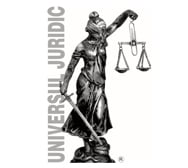
![Treaty on working time and rest time. Legislation. Doctrine. Jurisprudence - Alexandru Ticlea [1] Treaty on working time and rest time. Legislation. Doctrine. Jurisprudence - Alexandru Ticlea [1]](https://gomagcdn.ro/domains/editurauniversitara.ro/files/product/large/treaty-on-working-time-and-rest-time-legislation-doctrine-jurisprudence-alexandru-ticlea-3207-3620.png)
